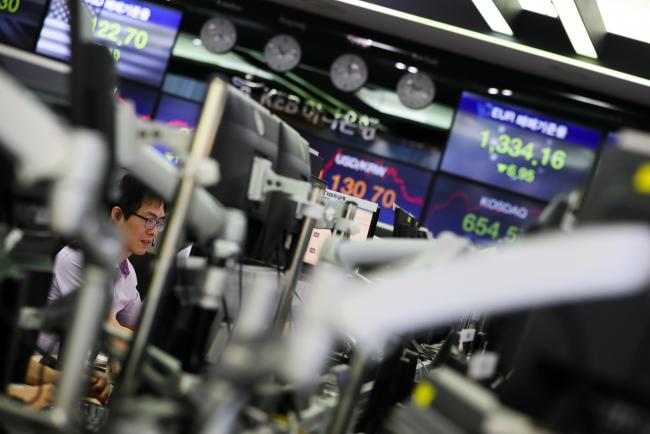(Bloomberg) -- After suffering from the worst annual slump in a decade amid trade war concerns and chip sector turmoil, investors in South Korea’s stock market now have even more reasons to worry.
About two-thirds of the 50 mostly large-cap Kospi index firms that have announced first-quarter earnings since early this week have missed analysts’ estimates, according to data compiled by Bloomberg. Analysts have lowered estimates for the index’s first-quarter earnings by 3.7 percentage points in April, according to KB Securities in Seoul.
Meanwhile, estimated earnings per share has fallen to the lowest level since the end of 2016. Valuations of Kospi companies are also a burden -- shares are trading at more than 11 times of their 12-month forward earnings, the highest since 2016.
One need look no further than tech stocks, which have the biggest weighting at almost 30 percent of the Kospi. An earnings disappointment from LG Display Co., a LCD panel maker, soured investor sentiment for the entire tech sector on Wednesday, including the likes of Samsung Electronics (KS:005930) Co. Peer SK Hynix Inc. added to the concerns by posting operating profit less than half its level from a year earlier.
“All of the market participants had been worried about first-quarter earnings for firms in both the U.S. and South Korea,” said Seo Sang-young, strategist at Kiwoom Securities. “They were wrong for the U.S., but correct for South Korea.”
The Kospi has still managed a 7.3 percent rally this year, though it falls well short of the MSCI All-Country World Index’s 15 percent advance.
The trouble on the earnings front comes as South Korea’s economy shows increasing signs of strain, posting the weakest growth for the first quarter in more than a decade. The nation posted first-quarter growth of 1.8 percent year-over-year, well short of economist estimates of 2.4 percent. Quarter-over-quarter growth meanwhile contracted 0.3 percent, while economists had expected an expansion. Exports contracted 2.6 percent from the previous quarter.
Read: Alarm Sounds for World Growth as Bellwether Economy Contracts
While the first-quarter GDP data was somewhat expected, what surprised investors more were “shocking earnings” of some large-cap stocks, according to Park So-yeon, analyst at Korea Investment & Securities. Among them was Samsung Biologics Co., the biotechnology arm of Samsung Group that posted an unexpected loss, disappointing many retail investors who poured money into a darling of the nation’s stock market amid the South Korea government’s push to nurture the industry.
Even with the recent headwinds, foreign investors see some upside potential in South Korea. They have added net 6.8 trillion won ($5.8 billion) of Kospi shares this year, mostly in Samsung and SK Hynix. The inflow into Korean equities has come mainly thanks to the Federal Reserve’s dovish stance, optimism about an end to the U.S.-China trade war and China’s stimulus measures, according to KB Securities.
“Worries over the trade war are already being priced in,” Heo Pil-Seok, chief executive officer at Midas International Asset Management, said.. “Some people start to say that it is time to buy the dip before a turnaround in the second half for some sectors.”
Commodity Prices
But the challenges can’t be ignored. Another one: The rise in commodity prices including oil is also a negative for many exporters in Korea. Posco, South Korea’s largest steel producer, posted a drop in profit and warned weakening demand and higher input costs with soaring iron ore prices. Refiners like SK also said the U.S. decision on ending the waivers on Iranian crude will lead costs to surge.
OCI Co., a chemical firm, reported greater-than-expected losses as the solar power industry struggled due to delayed stimulus measures of the Chinese government, according to Shinhan Investment Corp. China, the biggest trading partner for South Korea, also weighed on Korean exporters amid the ongoing trade conflict with the U.S.
“The U.S.-China trade war is hitting Korean traditional industries,” said Heo. “Especially, chips, refinery and chemical, which are heavily dependent on Chinese demand, are being affected.”
